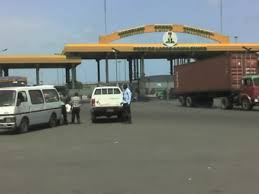One week after the suspension of the withdrawal of service action embarked upon by the freight forwarders and the amalgamated trucking association at the nation’s seaport and border stations, stakeholders in the nation’s maritime industry have described the action which lasted only for two days as successful.
Respondents who spoke in an interview with our correspondent in Lagos Wednesday stated that although most of the issues raised on the wake of the action was yet to receive the attention of the federal government, it sent the right signal to the government of the day.
According to the Chairman, Association of Igbo Maritime Practitioners of Nigerian (ASSIMPIN), PTML Chapter, Mr. Uchechukwu Aniezechukwu, although one would not call the action as an exercise in futility neither would one say that it achieved what it set out to achieve, however it served as a warning to the federal government on what may befall the sector if nothing tangible was seen to be done in that regard.
“I must commend every stakeholder that participated in that protest. It was a noble course, it is a golden aim but it is not yet uhuru. This is not time to do a holistic evaluation of the gains or losses of the withdrawal of service but I am of the opinion that a signal has been sent and a warning to the government.
“You will agree with me totally that our agitation was hinged on the bad access road, the arbitrary charges by the shipping companies and the unnecessary alerts from the customs as well as the corruption at the ports. These were the signals that have moved from the level of perception to the level of protest. The bad roads are still there, I can tell you authoritatively that the shipping companies collected their demurrages for those two days the withdrawal of service lasted; I can tell you that corruption is still going on at the ports and I can also tell you that alerts system in the Nigeria Customs Service is still on. So, from these evaluations, can it be said that anything was achieved?” Aniezechukwu queried.
On the essence of the strike when the variables remained unchanged, he replied,” the essence of going on a withdrawal of service is to begin a process. This is the second stage, after the new 21 days ultimatum, I expect to see a withdrawal of service that is more tenacious, more demanding, more hard, more encompassing than the first one and with that, I am of the opinion that we will get our demands. What I am seeing obviously is that it is still very early to ask the question whether the aim for which the withdrawal of service was called was achieved or not”.
On his part, the Chairman, International Freight Forwarders Association (IFFA), Chief Lawrence Ubah recalled that his association on the wake of the calls for the withdrawal of service dissociated itself from the planned action adding that his association’s president in a press release he issued at the time was emphatic that his association was not going to be part of the action as it was not going to yield anything tangible.
He pointed out that his association thought it was better for stakeholders to articulate their grievances and engage the government on their grievances rather than withdrawing their services saying that that was the position of IFFA during the withdrawal of Service.
“So, standing on that view point, I cannot assess what I was not part of because abinitio, we were of the view that withdrawing our services without exhausting every avenue of dialogue with the government will not yield fruit. So, we will leave it to those who carried out the action to assess the success or otherwise of the action and give us report”, he added.
Also speaking, the National President, Association of Registered Freight Forwarders of Nigeria (AREFFN), Dr. Frank Ukor maintained that the withdrawal of service shouldn’t have created more problem than it was meant to solve as the challenges they had at the ports were brought to the notice of the Federal Government for it to do something about them.
Ukor stated that although the federal government had not met their demands yet, they were optimistic that very soon, it would attend to them as some agencies of government namely; the Nigerian Shippers’ Council (NSC) and the Nigerian Ports Authority (NPA) held series of meetings with the stakeholders aimed at putting palliative measures in order to make the roads motorable pending permanent rehabilitation.
“So, I don’t think it will be right for anybody to say that it created more problems than it was meant to solve. Whatever problem it has caused, it is very minimal compared to the problems it will solve eventually. Gradually, government’s attention will be drawn to it. I even understand that these roads were not captured in the 2017 budget but definitely, they have to find a way to do these roads because it is very important because by the time the new 21 days expire and we go back to withdraw our service again, the effect will be very terrible”, he averred.
Recall that the freight forwarders and the truckers last week embarked on withdrawal of service over bad access roads to the ports, arbitrary charges by the shipping companies and terminal operators, incessant alerts from the Nigeria Customs Service, extortions from other government agencies and general corruption that characterized doing business at the port. The action was later called off two days into the action following series of appeals and entreaties made by the Executive Secretary of NSC and the Managing Director of the NPA with the freight forwarders and truckers issuing a fresh 21 day ultimatum to the federal government to meet their demands or they would resume their action.
Send your news, press releases/articles as well as your adverts to info@primetimereporters.com. Also, follow us on Twitter @reportersinfo and on Facebook on facebook.com/primetimereporters or call the editor on 07030661526, 08053908817.

